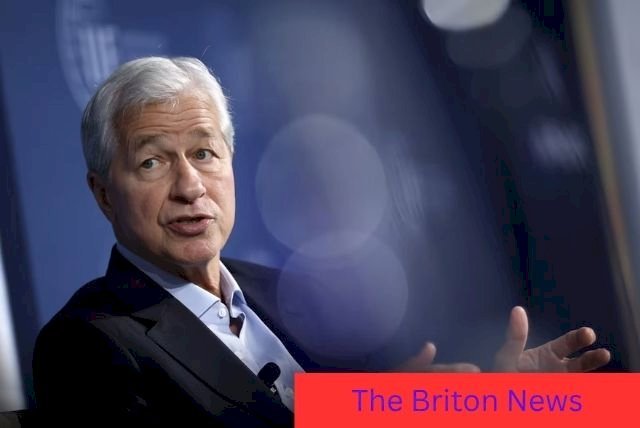Jamie Dimon Warns of U.S. Stock Market Correction as JPMorgan’s $2 Billion AI Investment Delivers Strong Returns
Jamie Dimon warns of a possible U.S. stock market correction as JPMorgan’s $2 billion AI investment begins delivering strong financial returns in 2025.

Jamie Dimon Sends New Warning to Wall Street
Jamie Dimon, the long-serving CEO and Chairman of JPMorgan Chase, has once again cautioned investors that the U.S. stock market may be heading toward a correction. Speaking at a financial summit in New York this week, Dimon said valuations “look stretched” and that investors should prepare for short-term turbulence as inflation, interest rates, and global instability continue to weigh on the economy.
“Markets don’t go up forever,” Dimon told attendees. “At some point, fundamentals have to matter again.”
His remarks immediately made headlines across Bloomberg, BBC, and CNBC, pushing the phrase “Jamie Dimon warning” into Google’s trending topics for finance.
Why Dimon Thinks a Correction Is Coming
Dimon’s latest comments come at a time when the S&P 500 and Nasdaq Composite are both trading near record highs. While many investors remain optimistic that rate cuts could sustain the rally, Dimon has taken a more cautious tone.
According to him, three key factors could cool down the bull market:
-
Persistent Inflation: Even as consumer-price growth slows, core inflation remains sticky, affecting corporate margins.
-
High Interest Rates: The Federal Reserve’s restrictive stance continues to squeeze borrowing and mortgage activity.
-
Geopolitical Risks: Ongoing conflicts in Eastern Europe and the Middle East, along with rising U.S.–China tensions, add uncertainty for global trade and commodities.
Dimon said these challenges might trigger a 10 to 15 percent correction if investors don’t recalibrate their expectations. Still, he was quick to remind the audience that corrections are part of a healthy market cycle.
“It doesn’t mean panic; it means prudence,” he said. “Good companies will come out stronger.”
Echoes of His Previous Predictions
This is not the first time Dimon has taken a conservative stance. In 2022 and 2023, he warned about “storm clouds” ahead of the U.S. economy — a phrase that later became famous when volatility returned during the banking-sector stress of 2023. Each time, his outlook has drawn global attention because of his track record for accurate early warnings.
Financial analysts say his perspective is valuable because JPMorgan has access to real-time data across multiple sectors — from consumer spending and credit cards to corporate loans and trading desks.
The Bright Spot: AI Investment Pays Off
While Dimon sounded cautious on markets, he had something far more positive to share about JPMorgan’s $2 billion artificial-intelligence investment. According to Dimon, the initiative — launched in 2022 to digitize and automate critical bank functions — is now generating returns equal to its cost.
“AI is already paying for itself,” Dimon revealed. “We’re saving the same amount we invested — and that’s just year one.”
The bank now uses over 400 AI applications, spanning fraud detection, algorithmic trading, credit-risk modeling, and customer support. Its proprietary platform, LOXM 2.0, analyzes millions of market orders daily to improve execution efficiency.
In customer banking, AI chatbots handle millions of service interactions each month, reducing wait times and improving satisfaction scores.
Internal studies show that JPMorgan has cut operating costs by nearly 5 percent since adopting its large-scale AI program — one of the most successful digital transformations in global finance.
How AI Is Changing Wall Street
Dimon’s success with AI has set a new benchmark for the financial industry. Competitors including Goldman Sachs, Citigroup, and HSBC are now racing to integrate similar systems.
According to research by McKinsey & Co., AI could help global banks save over $300 billion annually by 2030. JPMorgan’s early lead gives it a crucial edge in automation, fraud detection, and predictive analytics.
Dimon believes AI will reshape nearly every job in banking. However, he insists that the technology will create new roles rather than eliminate existing ones.
“AI isn’t replacing people — it’s amplifying them,” he said. “We’re using it to free our teams to focus on deeper client relationships.”
$5 Billion Headquarters Project in New York
Beyond AI, Dimon is also making headlines for his $5 billion redevelopment project in New York City — the new JPMorgan Chase headquarters at 270 Park Avenue.
The futuristic 60-story skyscraper is designed to accommodate 15,000 employees and will be one of the most energy-efficient buildings in Manhattan. It symbolizes Dimon’s confidence in the long-term strength of the U.S. economy — even amid his short-term caution.
“You don’t invest $5 billion in a city you think is in decline,” a JPMorgan spokesperson said.
The project, expected to open fully in 2026, is already revitalizing the surrounding Midtown area, nicknamed by locals as the “JPMorgan neighborhood.”
Global Outlook and Recession Talk
Dimon’s warning about a market correction also ties into his broader concern about the global economic slowdown.
He said the world may face a “mild to moderate” recession if central banks fail to balance inflation control with economic growth. However, he also noted that the U.S. remains fundamentally strong, backed by consumer spending, innovation, and corporate resilience.
“The American economy is the most adaptable in the world,” Dimon said. “But policymakers need to face fiscal realities — the growing deficit is a ticking time bomb.”
Financial Performance and Leadership
Under Dimon’s leadership, JPMorgan Chase remains the largest U.S. bank, holding more than $4.4 trillion in assets and earning record profits in 2024.
His compensation package last year was around $36 million, including bonuses and stock awards. Despite occasional shareholder scrutiny over pay levels, most investors continue to support him, crediting his steady hand during multiple crises.
Dimon, 69, has served as CEO since 2006, making him one of the longest-tenured leaders in modern banking. He has hinted that he may retire within five years, though he insists he is “not going anywhere just yet.”
Potential successors such as Marianne Lake and Jennifer Piepszak, co-heads of consumer banking, are widely regarded as front-runners.
Analysts and Market Reactions
Following Dimon’s latest warning, U.S. equity futures dipped slightly but quickly recovered, indicating investors view his comments as cautionary rather than alarming.
Market strategists at Goldman Sachs said Dimon’s remarks were “a reminder to stay balanced in portfolio positioning.” Others praised his transparency, noting that Dimon often speaks more candidly than most CEOs about economic risks.
On social media, his dual message — “prepare for volatility, but embrace innovation” — resonated with professionals across LinkedIn and X (formerly Twitter).
Within hours, “Jamie Dimon AI” and “JPMorgan warning” trended in the top 20 U.S. finance hashtags.
Dimon’s Legacy in Modern Banking
Few corporate leaders command as much respect as Jamie Dimon. His ability to guide JPMorgan through crises — from the 2008 financial meltdown to the 2020 pandemic — has earned him a reputation as Wall Street’s steady hand.
Unlike many executives who avoid controversy, Dimon often engages directly with policymakers and journalists, combining blunt honesty with deep financial insight.
His dual narrative of caution and confidence — warning about short-term risks while investing in long-term innovation — continues to define his leadership style.
Key Takeaways
-
Jamie Dimon warns the U.S. stock market could face a 10–15 percent correction in coming months.
-
JPMorgan’s $2 billion AI investment has begun delivering strong financial returns.
-
Dimon backs a $5 billion New York headquarters project, signaling long-term optimism.
-
He emphasizes that AI will enhance, not replace, human jobs in banking.
-
Analysts view his comments as a call for balance, not fear, in 2025’s volatile market.
Conclusion
Jamie Dimon remains one of the most influential voices in global finance — a leader whose words can sway markets and shape policy debates. In 2025, his message is clear: be realistic about short-term risks, but optimistic about innovation.
As JPMorgan’s AI transformation proves profitable and its New York expansion continues, Dimon’s brand of leadership — part skeptic, part visionary — once again defines the tone of modern banking.
“AI is paying for itself,” he said with a smile. “But wisdom still pays the biggest dividends.”
Also Read: https://britonnews.co.uk/fca-motor-finance-compensation-scheme-could-refund-14-million-uk-drivers

















